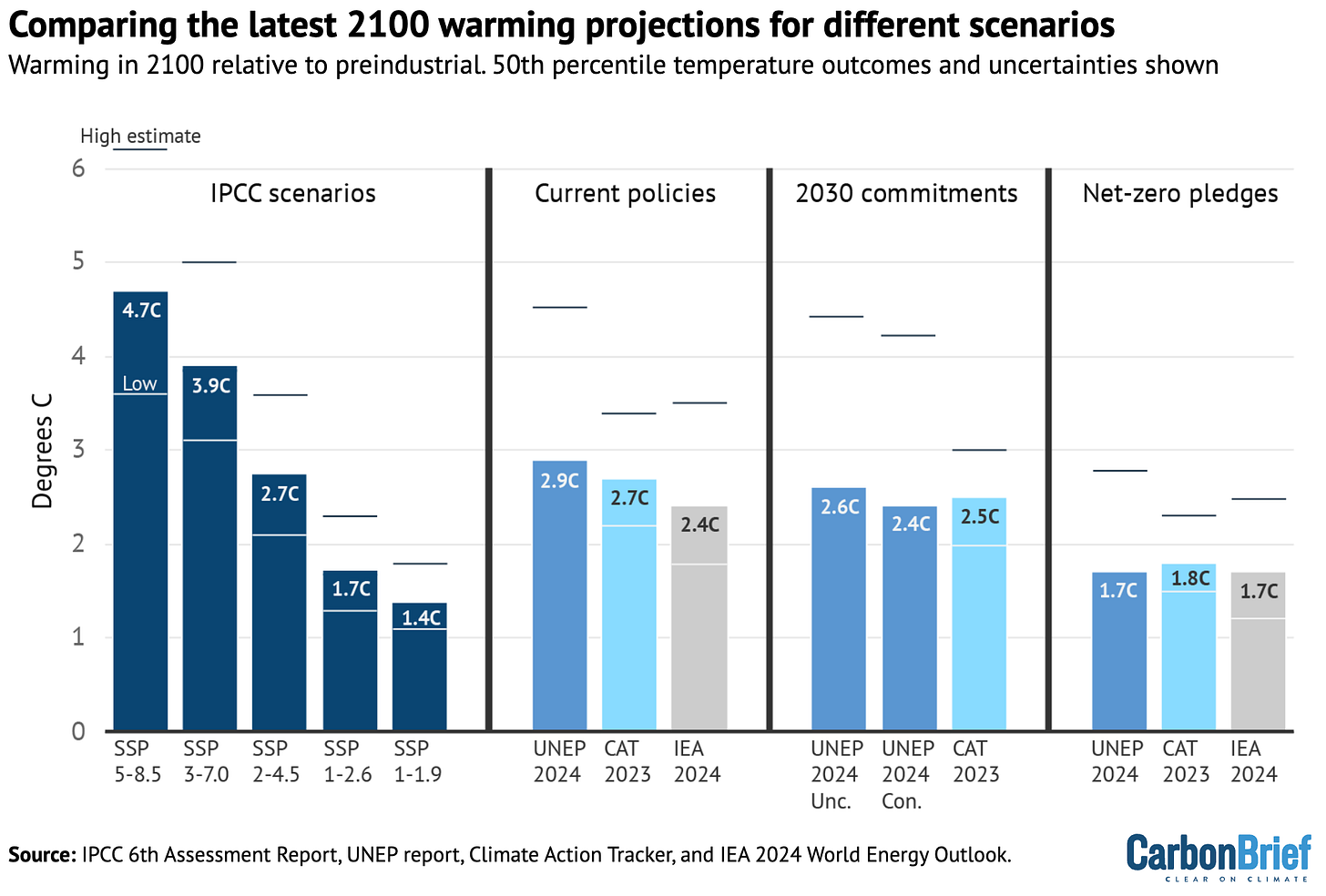Pop Quiz: How much does eliminating US CO2 emissions lower future temperatures?
And no peeking...
Here is a pop quiz for you: If the United States completely eliminated all carbon dioxide emissions tomorrow and every year for the rest of the 21st century, how much lower would future temperatures in 2100 be compared with keeping carbon emissions the same as today (according to climate models)?
Now what about future temperatures in 2100 if all wealthy nations (i.e. Europe, North America, Japan, and Oceania) did the same?
Don’t peek! Choose a number that you think aligns with your understanding of carbon dioxide and our climate…
Keep in mind, we are not just talking about electricity (which accounts for slightly less than 20% of carbon emissions). The question is about eliminating all carbon dioxide emissions from:
Industry
Commercial and Housing HVAC
Water heating
Transportation, including:
Automobiles
Buses
Trains
Short-haul trucking
Long-haul trucking
Airplanes
Inland shipping
Agricultural tractors
Military
Processing of petrochemicals
And probably a lot of other things that do not immediately come to mind…
And don’t forget that the United States is the second largest emitter of carbon dioxide in the world (or roughly 12.6% of global carbon emissions) according to EDGAR - Emissions Database for Global Atmospheric Research.
See also my other posts on Energy:
Unfortunately, most climate models are not available to the public, so we cannot just input numbers. Given that these models are often paid for by government funding, this is a bit of a travesty in itself, but I digress.
Fortunately, the United States Environmental Agency’s MAGICC climate model is available to the public. MAGICC was developed by:
The National Center for Atmospheric Research,
Potsdam Institute for Climate Impact Research (PIK),
Climatic Research Unit, The University of Melbourne,
Manchester Metropolitan University
As it states on their website: “MAGICC stands for 'Model for the Assessment of Greenhouse Gas Induced Climate Change'. It is a prime reduced-complexity model, often used by IPCC, for key scientific publications and by a number of Integrated Assessment Models.”
So the MAGICC climate model is legitimate and respected by the climate modeling community.
So have I built up suspense enough? OK, let’s reveal the answer…
Surprise!
According to the US EPA’s MAGICC climate model,
if the United States completely eliminated fossil fuel consumption today, it would only lead to 0.33 degrees F lower temperature by the end of the century (i.e. 2100).
If you made the same computation for all wealthy nations, it would only lead to 0.8 degrees F cooler.
This is such a small change in temperature that most thermometers cannot even measure the difference. It is just not credible to believe that such a small decline in average temperature would avert a climate disaster (Lomborg).
And this is the result of a proposal far more radical (complete elimination, now!) than any other climate proposal.
What about other proposals?
Other proposed solutions for climate change come out even worse, even if you assume that they will be fully implemented:
“The impact of the US Clean Power Plan (USCPP) is a reduction in temperature rise by 0.013°C by 2100.
The full US promise for the COP21 climate conference in Paris, its so-called Intended Nationally Determined Contribution (INDC) will reduce temperature rise by 0.031°C.
The EU 20-20-20 policy has an impact of 0.026°C,
EU INDC: 0.053°C
China INDC: 0.048°C.
All climate policies by the US, China, the EU, and the rest of the world, implemented from the early 2000s to 2030 and sustained through the century will likely reduce global temperature rise about 0.17°C in 2100.”
But what if the entire globe went Net Zero?
Even the scenario where the entire globe goes NetZero carbon emissions, does not result in that big of a change in future temperature. For example, here is a graphic from CarbonBrief, a climate change organization.
Let’s compare the “Current policies” projection with the “Net-zero pledge” projection. That is about as extreme a comparison as you can get. According to climate activists, this is the difference between apocaplypse and survival.
With no changes in public policy, global temperatures in the year 2100 are predicted to be 2.9C higher than the “pre-industrial baseline” or about 1.4C higher than current temperatures. Even if the entire globe goes NetZero (presumably by 2050), temperature in 2100 will still be 1.7C higher.
So after what is projected to be tens of trillions of dollars of spending for over 25 years, the result will be a 1.2C difference.
1.2 degrees Celsius!
And this is coming from carbon activists themselves.
That is barely enough for most thermometers to measure. It is simply not plausible to claim that 1.2C is enough temperature differential to be the difference between apocalypse and survival.
So why have I heard differently?
Let’s take another look at that graphic above. This time look at the left side that shows different IPCC scenarios. The scenarios are the baseline date that feeds into the climate models. Scenarios include assumptions for non-climate related data, such as fertility rate, population size, energy blend, etc).
I will write more on this in another article, but virtually everything that you have seen in the media or heard from activists, politicians, or climate scientists is based on models that use SSP 5-8.5. It is typically (and very misleadingly called “business as usual.” In fact, it is more accurate to describe SSP 5-8.5 as “absurdly pessimistic assumptions that were somewhat reasonable in the 1980s, but are now fantasy land.” The assumptions are so bad that the IPCC itself has called for its implausible, but yet climate researchers almost exclusively use that scenario.
Why?
Because it leads to alarming predictions that attract media attention. Fortunately, in the graphic above CarbonBrief used more plausible assumptions.
If you feed garbage assumptions into a model, you will get garbage back out the other side.
Why are these numbers so low?
Another reason these numbers are so low is because much of the carbon dioxide that will affect future temperatures is already in the atmosphere. Therefore, lower future emissions will have a relatively small downward effect.
The IPCC assumes that carbon dioxide remains in the atmosphere for 100 years or more. Under current technology, we have no cost-effective method to remove carbon dioxide from the atmosphere that is politically acceptable to Greens, so we have no choice but to adapt to future temperature increases or experiment with geo-engineering.
So Green energy policies:
are not reducing global carbon emissions, and
even if they did succeed, those reductions will have extremely limited effect on future temperatures.
Proposing radical policies with huge negative consequences and tiny long-term benefits is the height of folly.
The fundamental problem with Green energy policies
Do you ever wonder why Greens and other politicians never say how much of a temperature impact their favored policies make? They use the model to explain the impact of not doing anything, but somehow they fail to apply that same logic to their favored policy.
Why?
Because they know that everyone would laugh at how little impact their policies have. And, yes, this is true for even the most radical policies, like the complete elimination of carbon emissions now.
The fundamental problem with Green energy policies is that radical changes in energy usage lead to very small changes in future temperatures. This means that even if the West is successful at eliminating fossil fuels rapidly, which I argue is virtually impossible, doing so will have very little impact on future temperatures.
Remember that the goal of Green energy policy is not to build renewable energy. It is to reduce the future increase in global temperatures by drastically reducing global carbon emissions.
And it will undermine material progress
And these tiny temperature differences are not even taking into account the terrible effect of Green energy policies on economic growth in wealthy nations and developing nations.
Before determining future policy choices, one must first make a moral decision as to what one is trying to optimize: human progress or minimizing human impacts on the natural environment. I know that this is not an easy choice, but we must make a decision. Humans naturally want to have it all, and we have a difficult time choosing between two important values.
While it is not a zero-sum conflict between the two, as more radical environmentalists believe, there are some very real trade-offs between economic growth and eliminating carbon emissions. Since the widespread use of fossil fuels is one of the key foundations of human progress, we should not easily dismiss it.
Radically lowering the standard of living of Westerners would hurt the working class and the poor the most. Worse, it would make economic development in the rest of the world all but impossible. To anyone who believes in human material progress, this outcome should be unacceptable.
I believe that we should put human progress first.
There are alternatives
One of the key reasons why Greens have been able to dominate our discourse on energy policy is that no one has come up with a credible alternative policy. But there are alternative policies.
In the earlier article, I outlined a Progress-based energy policy to:
Create an energy system that is abundant, affordable, and secure. This will keep human material progress going. This should include both wealthy and developing nations.
Mitigate the negative side-effects of that progress on the natural environment. This includes carbon emissions, air pollution, water pollution, wild habitat destruction, extinctions, and human health concerns.
See also my other posts on Energy:









Thank you - much needed data to counter the arguments from the greens/left that “we have to do something to save the planet”.
Another way of making this point is to recognize that the relationship between CO2 and temperature is not linear. At some point, and we may already be at that point or past it, the CO2 warming effect becomes virtually saturated. This is described here: https://andrewromanviews.blog/2024/10/11/a-simplified-explanation-of-co2-and-the-greenhouse-gas-effect/.